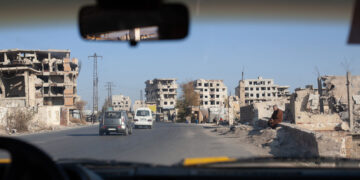Karim al-Yemani is the pseudonym for a researcher and reporter from Yemen, whose real name is not being used given the security situation in Yemen.
When a barrage of airstrikes hit dozens of sites across northern Yemen on the night of Jan. 12, most Yemenis in the capital, Sanaa, and other provinces who witnessed the bombings had no idea who launched them or why. Hours later, the U.S. Central Command claimed responsibility for the airstrikes, in cooperation with British forces. The military strikes aimed to "degrade" the Houthis' drone and missile capabilities and counter their attacks on shipping lanes off Yemen's Red Sea coast. The Houthis launched those attacks on commercial ships, starting in November, in a show of solidarity with Palestinians in Gaza, portraying them as a way to force Israel to end the war in Gaza.
Five months later, the airstrikes continue, and their impact in Yemen is magnifying. Joint British-U.S. strikes on Houthi targets on May 31, in Hodeida, killed at least 16 people and wounded 42 others, according to the Houthis—the highest publicly acknowledged death toll from these airstrikes so far. A building housing Hodeida Radio was among the sites hit; the Houthis said it was a civilian facility.
In all, 55 people have been killed in Yemen and 78 injured in the airstrikes since January, according to Houthi leader Abdul-Malek al-Houthi. In a recent speech on June 6, he said there had been 487 strikes on Yemen this year. The U.S. Navy, meanwhile, says it has conducted more than 450 strikes in Yemen, at a cost of about $1 billion in munitions.
By reporting the number of deaths and injuries from every airstrike, the Houthis have deepened feelings of antagonism toward the U.S. among Yemenis and attracted more supporters and fighters to their cause, particularly in areas of northern Yemen under Houthi control. U.S. military officials now admit they see no end to its military campaign, which has not deterred or "degraded" the Houthis, whose attacks continue to disrupt shipping in the economically vital Red Sea.
The ongoing American bombing campaign is provoking fury and fear across Yemen. U.S. airstrikes killing Yemeni civilians have made Washington a more public enemy in the country, even after years of devastating airstrikes by the Saudi-led, U.S.-backed coalition fighting the Houthis. The Saudi-led coalition's air war, which often relied on direct U.S. military support, hit civilian targets across Yemen, including homes, hospitals, markets and even weddings, killing some 24,000 people, including at least 9,000 civilians, based on conservative estimates. (The war's total death toll is around 377,000 people, according to the United Nations—over 150,000 the direct result of armed conflict, with many more from indirect causes, such as hunger and disease from the war's humanitarian crisis).
Direct U.S. airstrikes killing Yemeni civilians have made Washington a more public enemy in Yemen.
- Karim al-Yemani
Mohammed Ali, a 24-year-old university graduate in Sanaa, describes the U.S. air raids as a fresh "foundation" for further violence in Yemen. "When the Americans launched drone strikes on al-Qaida operatives in Yemen in the past, almost all Yemenis showed no sympathy to the terrorist individuals," he said. "But the ongoing American strikes on Yemen are hard to justify for Yemenis."
He added, "The only justification is that the U.S. does not want the Houthis to bother Israel that massacres, displaces and starves people in Gaza. I, like millions of Yemenis, cannot swallow such a justification."
When the airstrikes began in January, Ali thought that they would not last for long. The U.S. would declare its goals achieved in a few days or weeks, at most, he thought. "Today, the strikes are not only destroying military sites, they have also killed people, including civilians, which has further distorted the image of the U.S. in Yemen," he said.
While the Houthis have lost some of its weapons and members in the airstrikes, the militant group has earned more popular support among Yemenis and recruited thousands of new fighters. Young recruits keep graduating from training courses in several Houthi-controlled provinces. They all vow to confront the U.S. and its allies.
Younis Nasser, 22, graduated from a Houthi training course in Sanaa, which teaches both military training and extremist Houthi ideology. Before the American airstrikes on Yemen, he had no interest in joining in the Houthis, but his mindset changed after he repeatedly heard the explosions caused by U.S. airstrikes. "The American warplanes came to bomb and kill us out of the blue," he said. "We cannot condone such an injustice. What has happened has woken us up and convinced us to oppose any American agenda in Yemen."
In February, Human Rights Watch reported that the Houthis had recruited more than 70,000 new fighters in recent months in different provinces across northern Yemen, including child soldiers as young as 13, which is a war crime. "The Houthis are exploiting the Palestinian cause to recruit more children for their domestic fight in Yemen," said Niku Jafarnia, Yemen and Bahrain researcher at Human Rights Watch. "The Houthis should be investing resources into providing the basic needs of children in their territories like good education, food, and water, rather than replacing their childhood with conflict."
"I fear that the tide of violence will rise as long as the Houthi naval attacks continue. The Yemeni people will pay the price."
- Fawaz Ahmed, a 35-year-old resident in Aden
While anti-American sentiment is high in northern Yemen, where the Houthis dominate, it appears much lower in southern Yemen, which is under the control of a patchwork of groups, including the remnants of Yemen's internationally recognized government and various Yemeni militias, including southern separatists backed by the United Arab Emirates.
Fawaz Ahmed, a 35-year-old resident in Aden, said the American airstrikes were a "natural response" to the Houthi attacks on shipping lanes off Yemen's coast. Ahmed is not in favor of the American military operations in Yemen, and he isn't surprised by them, either. "It is not logical that the Americans would maintain their silence" amid the repeated Houthi missile and drone strikes on ships in the Red Sea and the Gulf of Aden, he said. "I fear that the tide of violence will rise as long as the Houthi naval attacks continue."
What he called the Houthis' "reckless behavior" has and will bring more suffering to Yemen, as the American airstrikes have shown. "The Yemeni people will pay the price," he said.





































